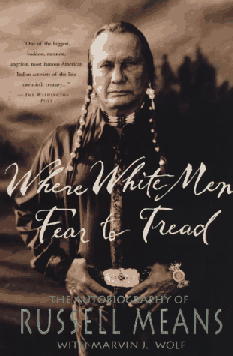A Facebook
discussion from a couple of years ago:
Here is an honest question. I am curious about many Natives who dance pow wow, yet grew up on the Navajo, Hopi or Apache reservations. Why dance Sioux and plains when clearly you are not? Why sing pow wow music when there are songs in your own language? Please shed some light. This is not designed to be harmful, but to gain truth. With respect, can you please let me in on this?Powwows have become pan-Indian events where people can share cultures with their fellow Indians. Tribes from California to Maine hold powwows now even though they didn't do these dances and songs traditionally.
Now Russell Means had an article that spoke of this, there are essays on this topic so I am not alone. This is a question many wanted to ask but were too afraid to in fear of getting their faces slapped. Do you have these articles? What is your stance??
Is there a loss of culture through pan Indian, and does it deconstruct the sovereignty as much was stripped in the boarding school era?Ideally, each tribe would revel in its own culture. But I think it's about a century too late for that. Powwows are a longstanding tradition for many tribes now.
It's hard to say what the effect is from the outside. On the one hand, there may be some loss of a tribe's unique traditions. You know, as they're replaced by the time and effort spent on powwows. On the other hand, participating in powwows may strengthen the members' pan-Indian identity. Which may lead to a renewed interest in their own cultures.
So it may weaken the tribal identity in some cases and strengthen it in others. I don't know enough to generalize more than that.
P.S. Since I'm not sure if powwows cause any harm overall, I wouldn't say they're anything like the assimilation done via boarding schools. I'd say that was much worse.
In a way these are most welcome as many who have survived the abuses of boarding school or working to reclaim elements of native culture that can be perpetuated for the generations to come. However I would like to see many languages and cultures also perpetuated so that many think natives have a firm and current grasp of their cultural and linguistic beliefs, rather than the appropriation of others (plains) yet I need more time to learn of this movement. As of many cultures around the world tribes unite and ideas of diverse culture are shared! and people and language go forward. Pow wows may be another example of the progression of forward movement of culture and the people wanting to be in this moment and say they are still here in full force! Great perspective, Russell Means thoughts on the Pan Indian movement were not as favorable.
Do you happen to have Russell Means' essay on the Pan Indian movement? Read it a time back in my undergrad and now cannot find it Where White Men Fear to Tread
H-Net Discussion Networks--Readings on Powwows (2 replies)Russell Means broadly comments on just about everything, including powwows. See _Where White Men Fear to Tread: The Autobiography of Russell Means_, with Marvin J. Wolf (St. Martin's Griffin, 1995), 69, 538. Means sees (or at least in one moment saw) powwows as "mockeries of our culture" and as "the lazy way to be an Indian." Naturally, many people disagree with this assessment.I think Means has a point, but it's ridiculous to blame the decline of Native cultures on powwows. One, a lot of forces were at work against tribes during the 20th century. Two, tribes have revived since the 1970s with new laws protecting sovereignty as well as Indian gaming. And yet powwows continue unabated. So the powwow/decline correlation no longer exists, if it ever did.



No comments:
Post a Comment